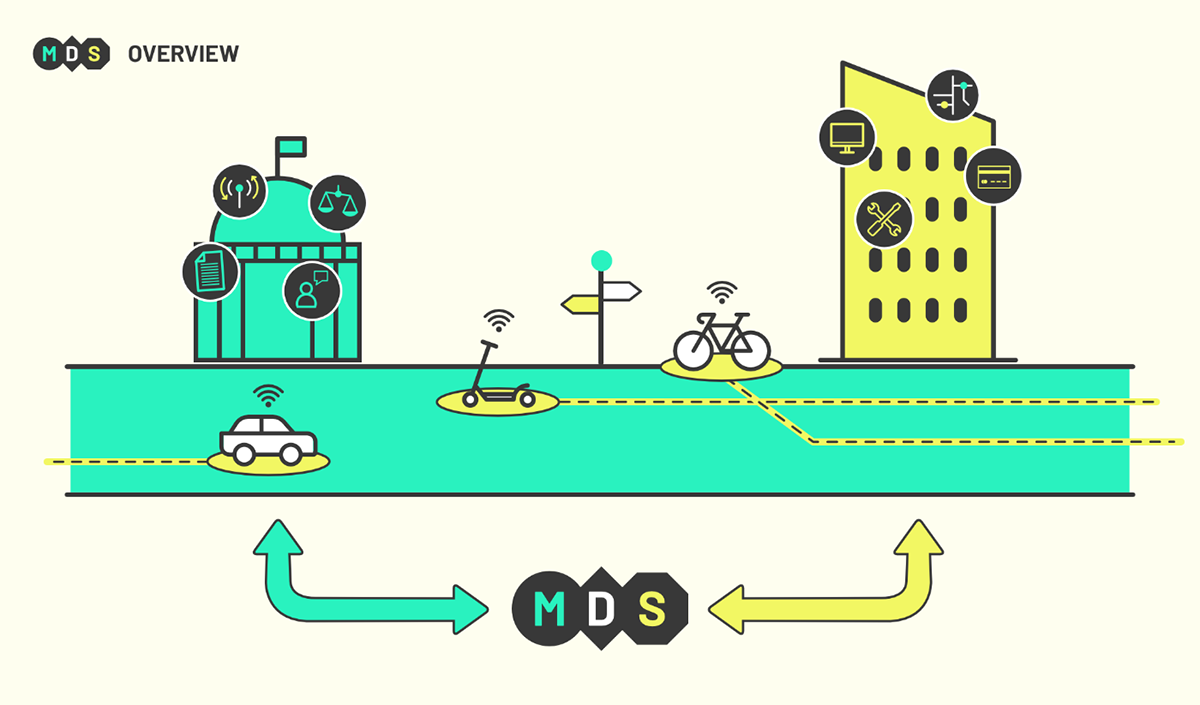Beyond Data-Sharing
MDS, CDS, API… These acronyms may leave many scratching their head in puzzlement; however, they are fast shaping the face of new mobility services and how local authorities and operators are coordinating data sharing. To get up to speed with the current face of data and digital tools, POLIS turned to the Open Mobility Foundation for some expert guidance.
An interview with Andrew Glass Hastings, elaborated by Isobel Duxfield.
The digitalisation of mobility and public infrastructure generates a wide volume of data that can be used to improve services and help meet shared policy goals. However, both cities and the new mobility services operating on their streets and sidewalks must be able to speak a common, digital language.
The OMF is a non-profit organisation whose mission is to transform the way cities manage transportation infrastructure in the modern era using well-designed, open-source technology. Founded in 2019, the OMF brings together public and private sector stakeholders to understand issues surrounding emerging mobility and create digital tools like the Mobility Data Specification (MDS), which is now used in more than 120 cities around the world, and the Curb Data Specification (CDS) which is being implemented by dozens of cities and companies for the dynamic management of curbs and pavements.
Following the release of their new data specifications, MDS 2.0, POLIS sat down with OMF’s Executive Director Andrew Glass Hastings to explore the Foundation’s journey so far and what lies ahead for data sharing for urban mobility.
POLIS: The OMF has grown quickly since it first began. How did the organisation start, and what was the journey to who you are today?
Andrew Glass Hastings: The Los Angeles Department of Transportation (LADOT) initially developed the Mobility Data Specification (MDS) in 2018. At this time, dockless e-scooters were rapidly launching in many U.S. cities, and the agency was tasked with managing this new mode amidst residents’ concerns about sidewalk accessibility and the safety of both riders and pedestrians. The goal was two-fold: providing a free and open-source, standardised way for municipalities to ingest, compare, and analyse data from mobility service providers, and allowing municipalities to communicate with mobility providers and ensure their adherence to governing regulations.

Andrew Glass Hastings, Executive Director, Open Mobility Foundation
A year later, as more cities adopted MDS and its potential to transform and modernise transportation infrastructure became apparent, LADOT decided that MDS could not reach its full potential unless all stakeholders — municipal, commercial, academic, and advocacy — could provide input and participate in its development. To facilitate that collective effort, OMF was formed and became MDS’s steward.
Today, the OMF remains a city-led organisation and has the support of more than 65 members representing a diverse group of public agencies, technology companies, and mobility service providers. We also recently launched a new digital tool, the Curb Data Specification (CDS) , that helps cities and companies pilot and scale dynamic curb zones. CDS provides a mechanism for expressing static and dynamic regulations, measuring activity at the curb, and developing policies that create more accessible, useful curbs. It allows cities to map curb regulations and capture data about how the curb is used. Capturing those insights allows policies to adapt to deliver the most public value.
POLIS: MDS is a digital tool that helps cities to better manage transportation in the public right of way. Why (and how) is it useful for cities?
Andrew: MDS meets a variety of city use cases around shared mobility services, including micromobility – and with the recent release of MDS 2.0 – it now covers car share, passenger services, and even delivery robots. These use cases are mainly centred on increasing equity, improving safety, planning infrastructure, and supporting access to public transit.

E-scooter in parking space. Credit: Mika Baumeister, Unsplash
For example, cities can use MDS to establish equity programs that require shared vehicle availability, especially for residents in historically underserved areas. MDS data allows cities to measure compliance with these policies, evaluate vehicle availability in specific locations that serve low-income populations, and compare service quality between high and low-income neighbourhoods. The public benefits from improved service, increased access to micromobility and improved first/last mile connections in underserved areas.
To protect public safety, many cities manage shared micromobility vehicles’ speed and where they may operate or park, especially in pedestrian-heavy areas. MDS is used to help prevent sidewalk riding where prohibited, protecting vulnerable pedestrians and people with disabilities.
Moreover, route data from MDS allows cities to improve safety through better infrastructure planning, and measure the effect of their investments. Last, can use MDS to understand how micromobility supports public transit access, and to capitalise on that modal link to support their climate and equity goals.
POLIS: So, what is the relationship between MDS and CDS? More than just acronyms right?
Andrew: Last year, in addition to MDS, the OMF introduced the Curb Data Specification or CDS. We believe that public streets and sidewalks can be safer, more dynamic, and deliver more value to residents and local businesses. That’s why the OMF is building digital tools to help cities effectively manage curb space such as CDS.
CDS is a digital tool that can help cities and companies pilot and scale dynamic curb zones. CDS provides a mechanism for digitally expressing static and dynamic regulations, measuring activity at the curb, and developing policies that create more accessible, useful curbs.
POLIS: Like POLIS, the OMF seeks to provide a safe, efficient environment for stakeholders including municipalities, companies, technical, privacy, and policy experts. Why do you think such forums are important for discussing this topic?
Andrew: We believe it is critical for stakeholders to both discuss this topic and also collaboratively build the digital tools that are used to manage mobility in the modern era. That’s the open source approach – rather than being developed by a single, central organisation, both MDS and CDS evolve through the contributions of hundreds of people from many different organisations.

MDS, connecting mobility stakeholders. Credit: Open Mobility Foundation
The OMF provides facilitation and a governance model that allows different stakeholders in the community to propose changes and to have those changes reviewed, critiqued, and improved by other community members. This collaborative space results in a better specification, one that’s been “stress tested” in advance by the people who will use it.
Last, the open model promotes a competitive ecosystem for software tools that cities buy. Too often, cities get locked into fully-integrated technology solutions that make it nearly impossible to switch vendors. These benefits of open source flow to the communities served by local governments. The open model gives local government a more effective tool to address local policy priorities, such as equitable access to services, increased safety for users of mobility services and other road users, and balanced use of public space.
POLIS: You also work widely to facilitate discussion between the public and private sectors on this topic. Data sharing has sometimes proved a “thorny” issue. “Trust” is a key term here; in your opinion, how do we better create a more cohesive discussion?
Andrew: At its core, the OMF is about bringing together public agencies and private stakeholders to collaborate in a trusted forum where diverse perspectives can be shared and heard. In this forum, there is an emphasis on identifying and rallying around common interests. One area of common interest is the development of Privacy Principles for Mobility Data.
The Principles are a set of values and priorities intended to guide the mobility ecosystem in the responsible use of data and the protection of individual privacy. They are intended to serve as a guiding “North Star” to assess technical and policy decisions that have privacy implications when handling mobility data. The principles are designed to apply to all sectors, including public, private, research, and non-profit.
POLIS: A key part of these debates is data privacy. How does MDS (and OMF’s wider work) address this issue?
Andrew: A big part of the OMF’s mission is to equip cities with the support and resources they need to put the right privacy practices and policies in place. With the help of our Privacy, Security, and Transparency Committee, we do this in two key ways.

How MDS connects multiple mobility services. Credit: Open Mobility Foundation
First, we create resources aimed at helping organisations understand the specification itself. We believe that developing a good understanding of how and why MDS is used – and what types of data are required to meet those use cases – is a critical step in centring citizen privacy and data security. These resources include a use case database and technical documentation outlining what data is – and is not – in MDS.
Next, we develop resources and provide privacy guidance for our members and developer community. Some key resources to note include an MDS Privacy Guide for Cities (which covers essential privacy topics and best practices for cities using MDS), a Guide for Using MDS Under GDPR (which is designed to help European cities and companies navigate privacy considerations under GDPR) and catalogue of real-world examples related to the handling and protection of MDS and other types of mobility data.
POLIS: As a POLIS member, you work closely with POLIS on all these topics. Why do you think this cooperation is important?
Andrew: The OMF’s POLIS membership and POLIS’ membership on the OMF’s Advisory Committee has been a valuable partnership. To fully realise the benefits of mobility standards they must be internationally developed and adopted. POLIS is a valued and respected convener and representative of cities in Europe. By working together, we can help familiarise more cities across Europe with the tools to manage transportation digitisation. We can also make sure that the mobility data standards and tools we develop are interoperable with data policies and requirements in the United States and Europe.
POLIS: What is next for the OMF?
Andrew: We are going to continue to work with cities and technology companies around the world to further our mission to transform the way cities manage transportation infrastructure in the modern era using well-designed, open-source technology.
In parallel, we will work with cities to help them adopt and implement MDS and CDS while looking toward the next versions of the specs and the functionality and capabilities that cities need to manage the digitisation of transportation.
POLIS: The deployment of data and digitisation in mobility is changing rapidly. Cast your mind forward, it is 2030 (the year many EU cities seek to achieve climate neutrality by), what does this landscape look like? What have been the major changes?

Bike hire. Credit: Ben Wicks, Unsplash
Andrew: 2030 is at the same time several years away and yet right around the corner. Over the next few years cities around the world will continue to experience the digitisation of mobility on their streets and will need new tools to manage this mobility.
Cities will seamlessly manage all forms of shared mobility on their streets, using digital infrastructure to manage the physical infrastructure in new and better ways, by bringing new approaches and technologies to curb management and intersection safety.
2030 will not only bring climate neutrality but it will also bring safer, more equitable and more livable communities.
Click here to read the article in its original format.
About the contributors:
Interviewer: Isobel Duxfield is Communications and Membership Manager at POLIS. She completed her MPhil in Gender Studies at the University of Cambridge where she researched gender and cycling. Isobel manages the SUM4All project and has published academic work on gender and active mobility, and domestic violence prevention.
Interviewee: Andrew Glass Hastings is the Executive Director of the Open Mobility Foundation. He has extensive experience working at the intersection of the public and private sectors. Andrew leads this unique public/private partnership where cities and companies collaborate in real-time to produce the open-source data standards and software tools cities need to digitise their infrastructure and manage all forms of mobility.
